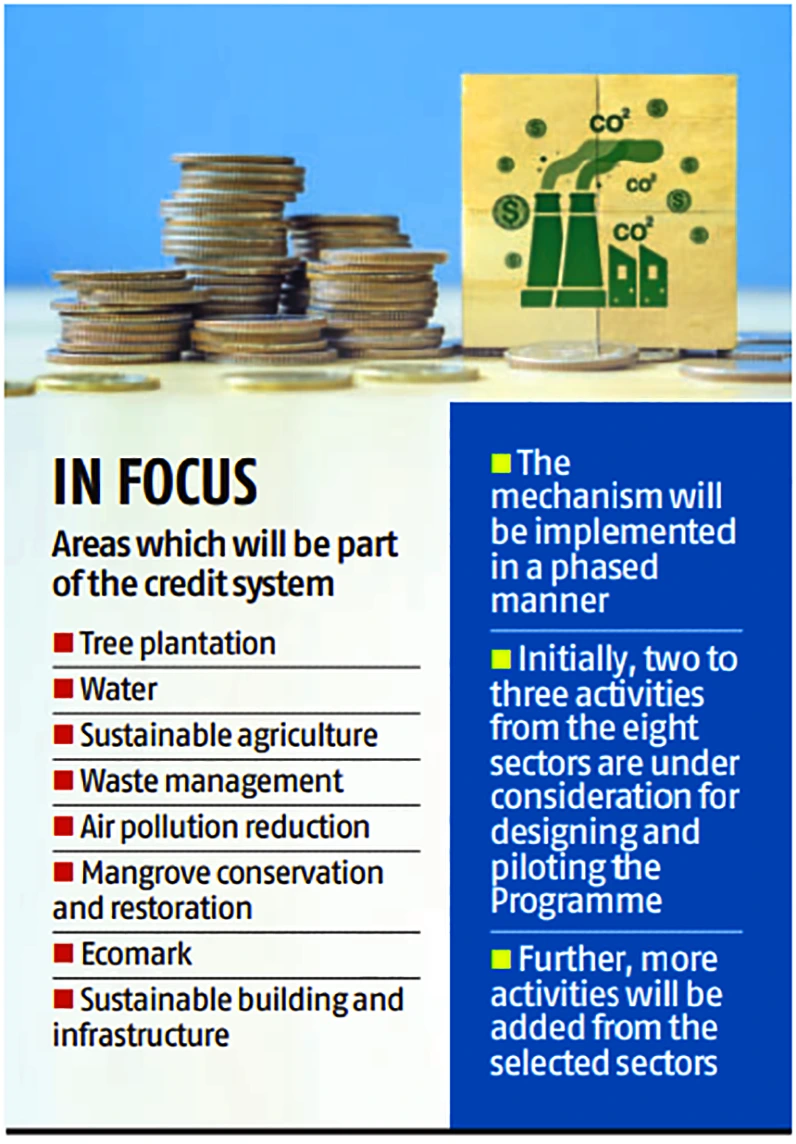Context: Recently, the Indian Prime Minister launched the Green Credit Program.
- During COP28 in Dubai, he emphasized that the Green Credit program surpasses the commercial nature of carbon credits.
What is the Green Credit Program?
- Launched by: The Ministry of Environment, Forest and Climate Change in October 2023.
- The Green Credit program was first announced in the 2023-24 Union Budget to incentivize voluntary environmental actions of various stakeholders.
- Administered by: The Indian Council of Forestry Research and Education (ICFRE).
- Focus on: Generating Green Credits through plantation on degraded wasteland.
- Its initial phase focuses on water conservation and afforestation.

- A Market-based Approach: It is an effort to create a market-based incentive for different kinds of environment-positive actions, not just for carbon emission reductions.
- This Green Credit program attempts to use this market-based mechanism for other environmental actions, like water conservation or soil improvements.
- CSR Obligations: As a starting point, the private companies would buy these green credits as part of their CSR obligations.
- The Companies Act, 2013 provides for Corporate Social Responsibility (CSR). Companies are required to spend a minimum of 2% of their net profit over the preceding three years as CSR.
- Measurement on Performance: Methodologies and standards to measure and verify such actions are still being developed. The market would also need to be developed.
- Significance: Green Credit program has a wider reach as it could benefit both individuals and communities.
- At COP28, the Indian PM offered the concept to the international community, in the hope of creating a market for green credits at an international level.
- While the carbon markets focused more on industry and corporations.
- Surpassing the Carbon Credits: The initiative has the potential to achieve optimal returns beyond just carbon.
- Achievement towards Sustainable Development Goals (SDGs): It would be a step towards achieving
- SDG 12: Responsible Consumption and Production
- SDG 13: Climate Action
- SDG 15: Life on Land
- Concerns: The initiative may lead to Greenwashing.
- Greenwashing is the act of making false or misleading statements about the environmental benefits of a product or practice.
- Experts are also raising concerns about the effectiveness of the mechanisms, monitoring, and verification.
Know more about the Green Credit Scheme here.
Carbon Credit:
- It represents the amount of Carbon Dioxide that has either been removed from the atmosphere or recycled. It generally represents the reduction in greenhouse gas emissions.
- Its concept originated from the Kyoto Protocol.
Earlier Available Practice:
- Trade in Carbon Credits: Such a market-based system for carbon already exists, at both the national and international levels, that allows trade in carbon credits.
- Claim for Credits: Companies, or nations, can claim carbon credits if they take action to reduce their carbon footprint.
- These credits can be traded for money.
- Companies unable to achieve their emission standards pay to buy these credits and improve their performance.
|
News Source: The Indian Express
![]() 7 Dec 2023
7 Dec 2023
